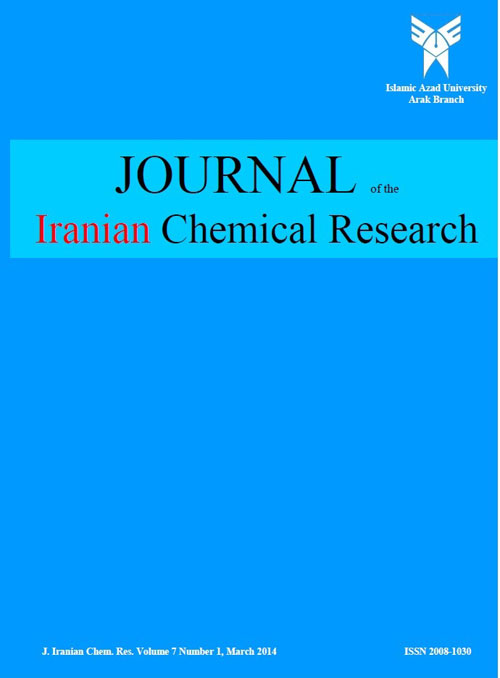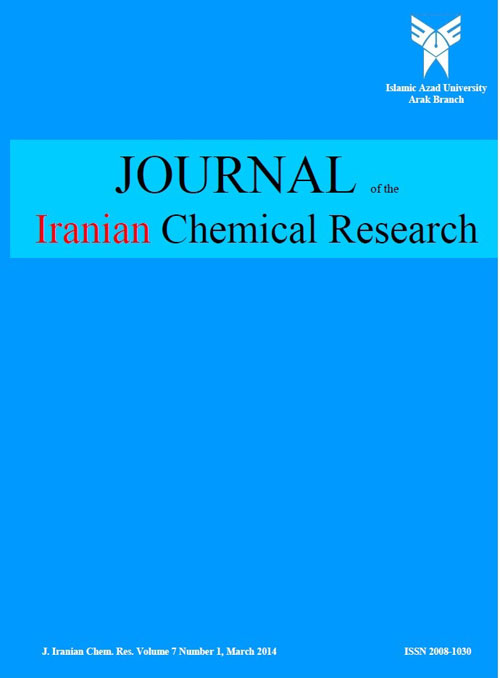فهرست مطالب

Journal of the Iranian Chemical Research
Volume:4 Issue: 1, Winter 2011
- تاریخ انتشار: 1389/12/25
- تعداد عناوین: 8
-
Pages 1-8Cis-polybutadiene was functionalized using insitu generated DMD as oxidant and tetra-n-butyl ammonium bromide as phase transfer catalyst (PTC). The epoxidation process was investigated by 1HNMR spectroscopy. 1HNMR spectrum analysis of products confirms the absence of ring opening side products in epoxidation reaction. Various factors such as reaction temperature, reaction time and the concentrations of oxidant, PTC and polymer are also examined in detail. Kinetic study showed that the catalytic epoxidation reaction of cis-polybutadiene is first-order with respect to double bonds and activation energy for the reaction is 22.82 KJ/mol.Keywords: Kinetic study, Polybutadiene, Oxone®, Epoxidation, Dimethyldioxirane, Tetra, n, butyl ammonium bromide
-
Pages 9-16Anodic stripping voltammetric determination of Pb, Cd, Zn and Cu in blood samples of 132 children was developed. The children's ages range was between 6 months and 6 years and the samples were collected from different areas of Ibb governorate (Yemen). We used anodic stripping voltammetry for analyzing and determination of cited metals in the blood of all children. Large variation in the results have been correlated to the area inhabited, age differences and other factors. It was found that areas, which have environmental struts such as waste solid and waste water, had more quantities of these metals in blood samples in comparison with other safer sites. This is may be due to the lower concentration of Cd and Pb in samples. Also the results indicate that both Pb, Cd found in high mean concentration in blood samples of males children than in females children similarly the effect of age indicate that all younger children (between 6 months and 1 year) had shown comparatively lesser quantity of these metals in comparison with elder children (between 4 6 yeas).Keywords: Anodic stripping voltammtery, Determination, heavy metals, Children, Blood
-
Pages 17-24A simple, economical, precise and fast visible spectrophotometric method has been developed for the determination of Azathioprine in tablet dosage form. Developed method is based on the formation of extractable colored complex of drug with colouring agent Indigo Carmine and Methyl orange. A wavelength maximum was found to be 683.7 nm and 566 nm. The concentration range of 15-50 μg mL-1 with of percentage recovery 100.05-101.31 %, while the linear regression, LOD and LOQ were 99.42-99.08 %, 0.38 and 0.84 μg mL-1 and 0.74 and 0.18 μg mL-1, respectively. Two new sensitive spectrophotometric methods are proposed for the determination of Azathioprine using bromate-bromide mixture and two dyes, methyl orange and indigo carmine, as reagents. The methods entail the addition of a known excess of bromate-bromide mixture to Azathioprine, in acetic acid medium followed by determination of residual bromine by reacting with a fixed amount of either indigo carmine and measuring the Absorbance at 683.6 nm (Method A) or methyl orange measuring the absorbance at 566 nm (Method B).Keywords: Azathioprine, Spectrophotometric, Indigo Carmine, Methyl orange
-
Pages 25-31Two simple, accurate and precise methods for simultaneous estimation of Esomeprazole and Itopride in bulk drug and tablet dosage form have been described. Method-A employs formation and solving of simultaneous equation using 231 and 370 nm as two analytical wavelengths. Method -B is Absorption ratio method, which uses 308 and 331 nm as two analytical wavelengths.Beers law was obeyed in the concentration range 5-35 μg/ml for Esomeprazole and 5-40 μg mL-1 for Itopride. In the present investigation, 0.5 Metformin hydrochloride solutions (hydrotropic solubilizing agent) were employed to solubilize, Esomeprazole and Itopride from fine powder of its tablets to carryout Spectrophotometric analysis. The optimized methods showed good reproducibility and recovery with standard deviation ofKeywords: Hydrotropic agent, Esomeprazole, Itopride hydrochloride
-
Pages 33-38Indandione 1 was brominated to yield 2-bromoIndandione 2 which on further reacted with substituted thiocarbamides, carbamides, 2-aminothiophenols, 2-aminophenol and triazoles to furnished 3-substituted aniline-2-thia-4-aza-6,7-benzo-8-oxo-bicyclo [3.3.0]-1(5),3-octadiene 3, 3-substituted aniline-2-oxa-4-aza-6,7-benzo-8-oxo-bicyclo [3.3.0]-1(5),3-octadiene 4, 2-Thia-5-aza-9-oxo-3,4-(3-substituted) benzo-7,8-benzo-bicyclo [4.3.0]-1(6) nonene 5, 2-oxa-5-aza-9-oxo-(3, 4)-(7, 8)-dibenzo-bicyclo [4.3.0]-1(6) nonene 6, 3-substituted-(1,2,4) triazolo [4,5-b] [indeno (2,3-e)]-1,3,4-thiadiazine 7 respectively.Keywords: Monobromoindandione, Thiocarbamide, Carbamide, 2, Aminothiophenol, 2, Aminophenol, triazole
-
Pages 39-49NBO analysis and density functional theory (DFT: B3LYP/6-311**) based method were used to study the impacts of the anomeric effects (AE) on the conformational properties of 2-methoxy-1,2,4,5-tetrahydro-benzo[d]oxepine (1), -thiepine (2) and -selenepine (3). The Gibbs free energy difference (GeqGax) values (i.e. ΔGeq-ax) at 298.15 K and 1 atm between the axial and equatorial conformations increase from compound 1 to compound 2 but decrease from compound 2 to compound 3. The NBO analysis showed that the AE associated with donor-acceptor (LP→σ*) interactions increases from compound 1 to compound 2 but decreases from compound 2 to compound 3. Also, the calculated dipole moment difference [Δ(μeq - μax)] values between the axial and equatorial conformations increase from compound 1 to compound 2 but increase from compound 2 to compound 3. Based on the results obtained, there is no conflict between the AE and the electrostatic interactions [i.e. Δ(μeq - μax)] on the conformational behaviors of compounds 1-3.Keywords: anomeric effects, Tereoelectronic interactions, Molecular modeling, Ab initio, NBO, Tetrahydro, benzo[d]oxepine
-
Pages 51-574-Chloro-3,5-dioxaphosphacyclohepta[2,1-;3,4-']dinaphthalene (BINOL-PCl) was found to be an efficient, bulky and selective reagent for the transformation of symmetric and asymmetric benzoins to the corresponding benziles at 0 °C to room temperature under nitrogen atmosphere in good yield.Keywords: 4, Chloro, 3, 5, dioxaphosphacyclohepta[2, 1, 3, 4, ]dinaphthalene, Transformation reagent, Benzoin, Benzil
-
Pages 59-68Maleic anhydride (MAN) copolymers with methyl methacrylate(MMA), ethyl methacrylate(EMA), methyl acrylate(MA), ethyl acrylate (EA) and buthyl acrylate (BA) ( in a 1:1 mole ratio) were synthesized by free radical polymerizations method under vacuum -azobis(isobutironitrile)(AIBN) as an initiator of reaction at 701C. The copolymer compositions were determined using related 1H NMR spectra technique and the polydispersity indices of the copolymers determined using gel permeation chromatography (GPC) method. Then Carbazole (Cz) groups were attached to the obtained copolymers by ring opening reaction between carbazole and anhydride groups of MAN units to give the copolymers ICz-VCz in high yields. The anhydride group possesses a higher reactivity with the carbazole group. The ring opening reaction between the anhydride group and the carbazole is simple and fast. All the prepared polymers, were characterized by FT-IR and ¹H NMR, spectroscopic techniques. The glass transition temperature (Tg) of all copolymers was determined by dynamic mechanical thermal analysis (DMTA). All the polymers containing carbazole groups presented a high glass transition temperature in comparison to unmodified copolymers (I-V). It was found that these polymers with carbazole moieties have high thermal stability and the presence of bulky carbazole groups in polymer side chains leads to an increase in the rigidity of polymers.Keywords: Chemical modification, Maleic anhydride, Carbazole, Dynamic mechanical thermal analysis, Glass transition temperature


